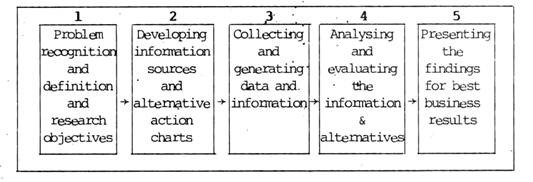In this article we will discuss about:- 1. Process of Marketing Research 2. Scope of Marketing Research 3. Advantages or Benefits 4. Importance.
Process of Marketing Research :
Marketing research is the process of the use of scientific methods for enquiring into the marketing problems and their solutions.
According to Philip Kotler, the marketing research process with five distinct steps can be described in the following logistics:
Step 1:
This step is the most important one and emphasis is laid to identification of marketing and research problems with respect to the elements of industry, competition and customers of marketing aspects and to the situation analysis of product-market scope.
Step 2:
This step is self-explanatory. It involves the formal research or study to develop relevant information sources like company records, govt., statistics, and private reports.
Step 3:
This step involves observation and surveys so as to collect data and information relevant to the problem.
Step 4:
In this step, raw data and information are analysed and evaluated to find out significant ones. Statistical and other techniques are applied for the purpose of analysis and interpretation.
Step 5:
This final step involves the preparation of the research report, on the basis of findings and significant results, to be presented to the marketing management. Such report must highlight the basic problem, alternative approaches to solution, and recommendations for action.
Scope of Marketing Research :
The scope of marketing research is as broad as the marketing management process itself. Its scope is wide to include any problem or area such as determination and measurement of market potential; analysis of market share, sales- potentialities, competitive product characteristics, new product potential and positioning, market positioning; studies of business trends; and so on.
Although it is difficult to have a comprehensive list outlining the scope, we may specify the following scope of marketing research in bread terms:
1. Research on Products and Services:
(i) Analysis of consumers’ attitudes towards proposed new products and/or services.
(ii) Comparative study of consumer’ attitudes towards existing products and/or services with similar competitive products and/or services.
(iii) Determining new or improved uses of existing products.
(iv) Adopting and implementing new designs or characteristics to the existing product and novelty in packing.
(v) Evaluating modifications on the product in the light of competitive products.
(vi) Study and analysis of national and/or international standards and specifications for incorporation in the existing product development policy.
(vii) Estimating probable marketing success or failure through test market operations on new or improved products.
2. Research on Markets:
(i) Study of potential demand of existing products in different market segments.
(ii) Analysis of the size and characteristics of the market for certain specific products.
(iii) Analysis of market segment-wise sales opportunities and potentials, profits and profitability, changes, and trends, etc.
3. Research on Sales Policies and Methods:
(i) Analysis of the pricing structure and discounts offered in relation to competition.
(ii) Study of the impacts of present pricing structure on sales volume in general and in specific market segments.
(iii) Analysis of selling costs, distribution costs, advertising and publicity costs, salesmen’s activities, sales promotion devices, product distribution methods, etc.
(iv) Measurement and evaluation of existing selling practices, proposed selling policies, competitors’ selling tactics, and so on.
Advantages or Benefits of Marketing Research:
The knowledge about the consumers and their preferences, competitors and their products, various markets, supply and demand position, public or society’s acceptances or rejections of new or modified products and so on is essential not only for the firm but for the marketing management as well. Marketing research provides such knowledge and helps in reducing the risks involved in marketing decisions.
However, the marketing research offers the following advantages:
(1) It gives information about the market, reveals market or business trends, and discovers potential markets for both the existing as well as new products. These are pre-requisites for marketing planning and strategy.
(2) The consumers’ habits and preferences being studied and analysed, it helps the firm to knew about why, where, and when the consumers buy the company’s products. With this information, marketing personnel can be directed properly for improving the marketing operations.
(3) It facilitates the formulation of sales forecasts thereby the sales planning, the planning and scheduling of production, and the planning of other associated factor-inputs that are necessary for the running of a firm.
(4) It provides the firm an opportunity to understand and rectify its defects, shortcomings, or failures in the product-market position and scope.
(5) It assists in studying the effectiveness of the channels of distribution, sales promotion devices operated, and advertising media selected, etc. for the advancement and improvement of marketing decisions, options, and programmes necessary for the well-being of a firm.
Importance of Marketing Research:
Research, whether in marketing or other fields, is not simply limited to the fact-finding. Business decisions, particularly marketing-related decisions are always concerned with the future.
So marketing research which aims at understanding the future uncertainties is essential to minimise the inherent risks involved in new product planning, introduction and positioning. Sound decision-making and programme setting are pre-requisites for marketing success. The marketing research through its system of data interpretation and analysis helps in these directions.
Business planning is a participative job and involves considerations as to the economic, social, political, industry and market factors that affect a business firm’s future. Unless the information on then is developed and properly refined, business for casts for the markets and competition are likely, to be misleading.
Marketing research, the other name of marketing data analysis and refinement, can achieve the above objective and aid the entire business firm.
In recent years, the business leaders are attaching importance to the marketing research in view of its practical value and added insight to any phase of the marketing activity.
